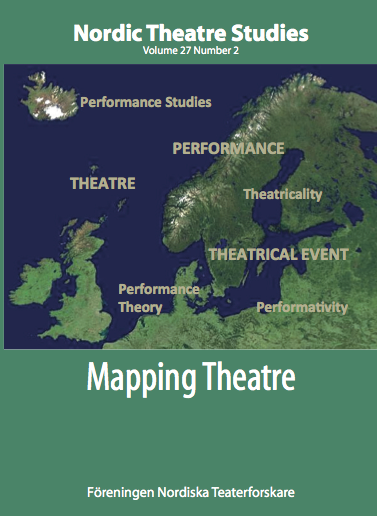Otherness and Self in Latvian Theatre: Changes at the Turn of the Nineteenth Century
DOI:
https://doi.org/10.7146/nts.v27i2.24255Abstract
In the article, political and historical interpretations of the first play in Latvian, an adapted translation of Ludvig Holberg’s Jeppe of the Hill (1723, Latvian version 1790) are explored. Although the play has been often interpreted as a work of anti-alcohol propaganda, the article argues that the political motives of the play are no less important. Translated into Latvian during the time of the French revolution, the play mirrors the tense atmosphere of the revolutionary years and reflects changes in Latvian peasant identity. While translating, Baltic German pastor Alexander Johann Stender changed the play’s setting to the late eighteenth century Courland and added new details, emphasizing the social conflict of the play as an ethnic one. It has been argued in the article that since ‘class’ in the Baltics was divided along national lines, the difference between peasants and masters was also the difference between Latvians and Germans, so class and ethnicity merged. When the peasant and the nobleman switch places in the play, this symbolizes a change in the Latvian-German colonial relationship. The colonial interpretation allows for a characterisation of the protagonist as a desperate imitator – a colonial subject who loses his identity as a serf and is not able to form a new identity in any way other than by copying the colonialist op- pressor. But this mimicry turns into ridicule, hence the play acquires a political meaning as it implicitly shows the disastrous consequences of revolutionary pro- test. Therefore, the play can be read as a part of the discussions about the Baltic Enlightenment emancipation project and as a hidden debate on serfdom and the colonial framework of the Courland societyReferences
Aleksejs Apīnis, Grāmata un latviešu sabiedrība līdz 19. gadsimta vidum, Liesma, Rīga 1991.
Mikhail Bakhtin, "Karnevãls un literatūras karnevalizãcija" in Grãmata, no. 6, 1991.
Andrew James Blumbergs, The Nationalization of Latvians and the Issue of Serfdom: the Baltic German Literary Contribution in the 1780s and 1790s, Cambria Press, Amherst 2008.
Henry Brunschwig, Enlightenment and Romanticism in Eighteen-Century Prussia, The University of Chicago Press, Chicago, London 1974.
Oto Čakars, Arvīds Grigulis, Milda Losberga, Latviešu literatūras vesture: No pirmssākumiem līdz 19. gadsimta 80. gadiem, Zvaigne, Rīga 1987.
Pauls Daija, "Volksaufklärung in der Lettischen Literatur des 18. jahrhunderts" in Deutsch-Baltisches Jahrbuch, no. 63, 2015.
J. Chr. Dieterich, Revolutions-Almanach von 1794, Göttingen 1794.
Victors Hausmanis, Latviešu dramas sākotne, Zinātne, Rīga 2009.
Bent Holm, “Jeppe of the Hill” – A Dream Play: A Historical and Dramaturgical Interpretation” in North-West Passage. Yearly Review of the Centre for Northern Performing Arts Studies, no. 1, 2004.
Bent Holm, "Ludvig Holberg and His Double: Holberg in Scandinavia" in Ludvig Holberg: A European Writer: A Study in Influence and Reception, Sven Hakon Rossel,ed., Rodopi, Amsterdam, Atlanta 1994.
Andrejs Johansons, Latvijan kultūras vesture, Daugava, Stockholm 1975.
Friedrich Wilhelm Kade, Freimütige Gedanken über den Nutzen, die Grenzen und Einrichtung des Unterrichts für Letten, Kanter, Königsberg 1794.
Juhan Kahk, "Der Bauer in der Literatur und im wirklichen Leben. Die progressiven baltischen Publizisten an der Grenzscheide des 18. und 19. Jahrhunderts und ihr Held" in Der Bauer Mittel- und Osteuropas im sozio-ökonomischen Wandel des 18. und 19. Jahrhunderts, Böchlau, Köln, Wien 1973.
Benedikts Kalnačs, “Daži jautājumu loki ap nemirstīgo Žūpu Bērtuli” in Varavīksne. Literārā mantojuma gadagrāmata, Preses nams, Rīga 1994.
Kroders, “Ludvig Holbergs: Žūpu Bērtulis” in Latvijan Vēstnesis, 12 December 1924.
Kārlis Kurcalts, “Latviskās dramas sākums” in Daugava, no, 12, 1933.
Valija Labrence, “Feodālisma iršanas in kapitālisma tapšanas periods” in Latviešu literatūras vesture.” in Latviešu literatūras vesture. 1.sĕj. Latviešu folklore un literature lïdz 19. gs. vidum, LPSR ZA izdevniecĩba, Rīga 1959.
Christian Launitz, No Brīvestības un viņas iecelšanas Kurzemē, Steffenhagen, Mitau 1819.
Christiane Leiterlitz, "Die französische Revolution im Spiegel der Literatur" in Wende von der Aufklärung zur Romantik 1760-1820, Horst Albert Glaser, György M. Vajda, des., Hojn Benjamins, Amsterdam, Philadelphia, 2001.
Garlieb Merkel, Izlase (Selected Works), Liesma, Rīga, 1969.
Alexander Radischev, Ceļojums no Pēterburgas uz Maskavu, Liesma, Rīga 1978.
Georg Rauch, "Die französische Revolution von 1789 und die Baltische Provinzen" in Baltic History, Arvīds Ziedonis et al, eds., AABS, Ohio, 1974.
Hans-Jürgen Schings, "Kein Revolutionsfreund: Die Französische Revolution im Blickfeld Goethes" in Goethe Jahrbuch, Wallstein, Göttingen 2009.
Alexander Johann Stender, Lustesspēle no zemnieka, kas par muižnieku tape pārvērsts, un viena pasaka no drauga Licepura, Steffenhagen, Mitau 1790.
Arveds Švābe, Kāda mācītāja dzīve, Daugava, Stockholm 1958.
Downloads
Published
How to Cite
Issue
Section
License
The copyright belongs to the authors and Nordic Theatre Studies. Users can use, reuse and build upon the material published in the journal but only for non-commercial purposes. Users are allowed to link to the files, download the files, distribute the files on a local network (preferably by links), upload the files to local repositories if their institutions require them to do so, but not republish the files without proper agreements with the journal and the author.

